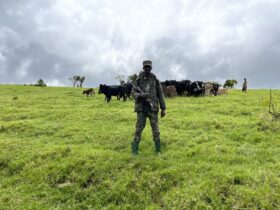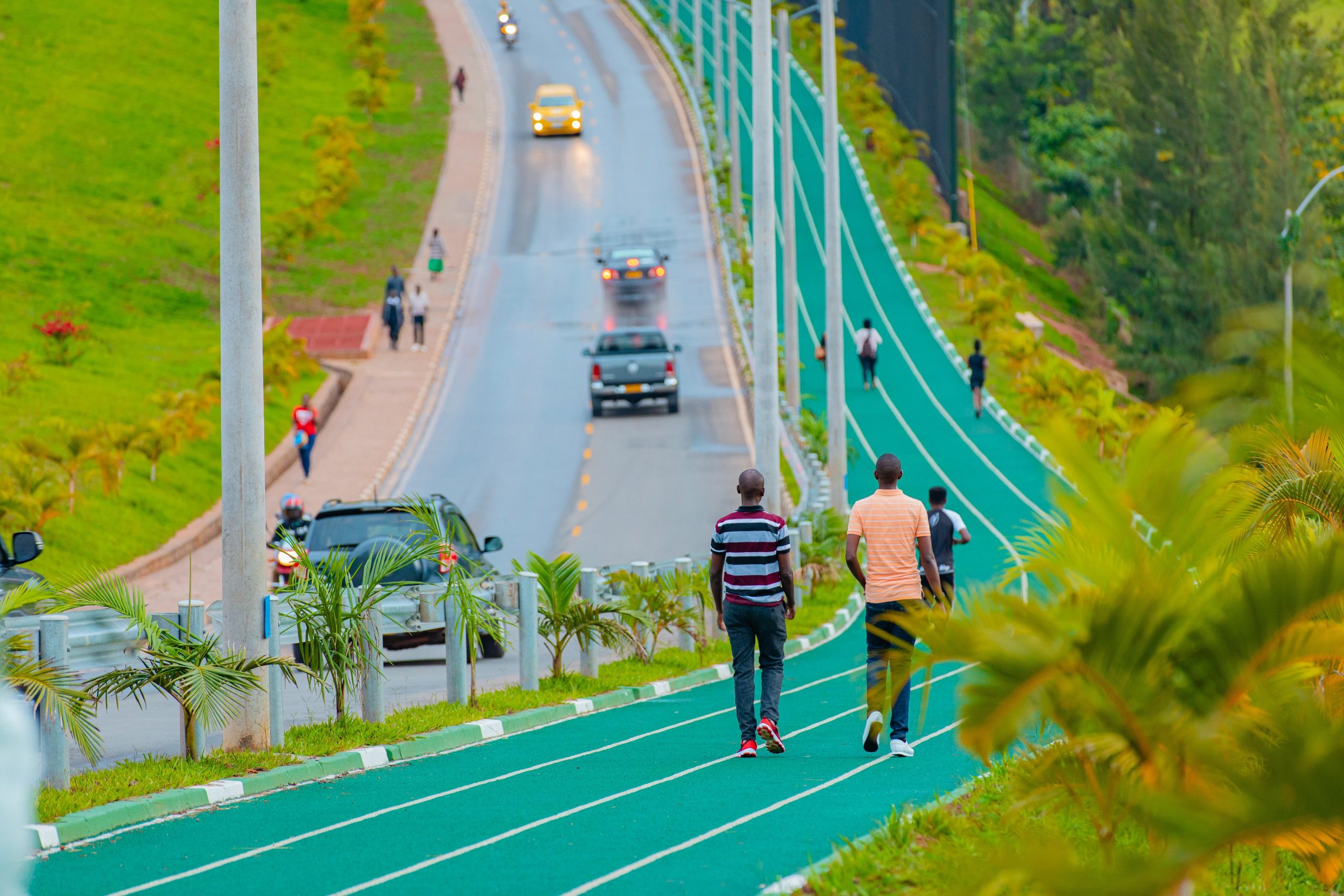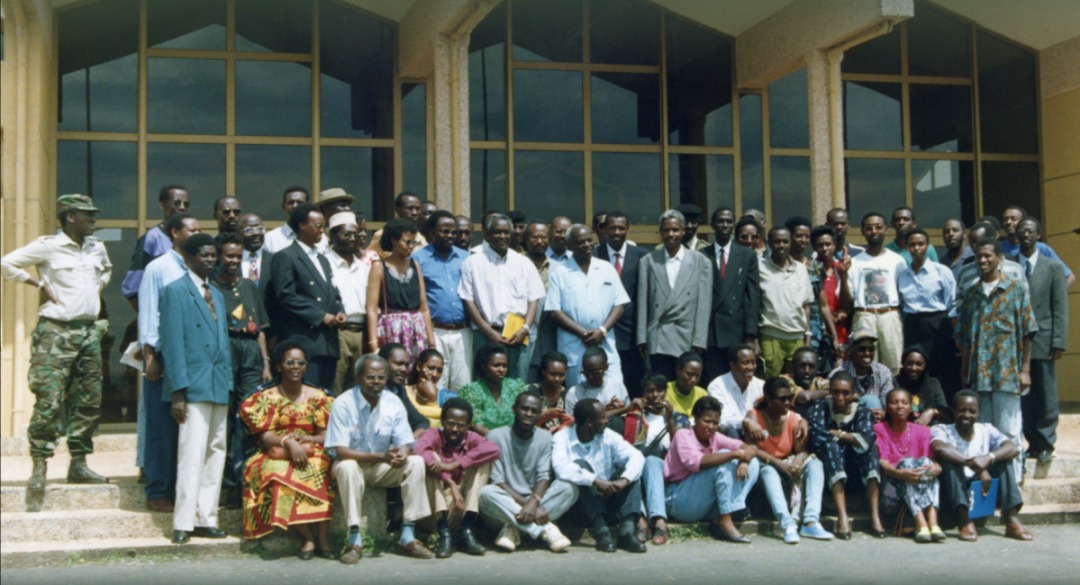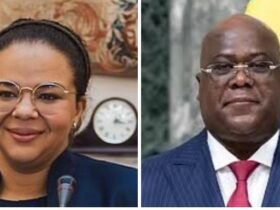The Rwanda liberation struggle had fathers and mothers
A Tribute…
By Christine Nyinawumwami Umutoni.
On 15th May, I sat on the balcony at Assamala’s apartment with other ladies she had invited for “coffee” which ended up being drinks and dinner. An idea was born! Or rather, a story was born, this story. Our hostess looked at me and said, “how are you feeling Christine?” I am ok, I said; it’s just that we don’t get used to these things. I had just finished a zoom event on the commemoration of the Genocide against the Tutsi-KWIBUKA 27. We had rushed to her house as it was drizzling. We wore our long black and grey Mishanana (Rwanda ladies dress), I was with Honorraille Iradukunda (Mimi), a young student who was the co- MC for the commemoration event.
At dinner, we discussed many things and chatted through-out the evening; the ladies asked me many questions about the Genocide, specifically about the suffering of the widows and orphans, the brutal killings of Tutsi. And Mimi asked how did the Genocide and the war end? How were the survivors saved?
I thought to myself, those are chapters of a book or titles of many books. I stood up to grab a glass of water in the sitting room and when I looked at the shelf, I saw a book with Assamala’s name. And I asked,
- you write? She answered yes.
- Oh wow! I must come for lessons! How do you write a book? We made a rendezvous to meet…
A few weeks I was at her house, only the two of us for another cup of tea and to talk about writing.
- Why do you want to write? What do you want to write? Tell me a little bit about yourself, what is your story? My Hostess asked.
You know sometimes you start by writing articles, small stories, poems and later books.
I am not sure of what I want to write about, I said. But for now it is not about my story, it is probably about history. I would like to simply share what I saw, heard, and experienced in the past as it relates to my country, Rwanda.
But tell me a little bit about yourself, Assamala insisted. Well it is a typical story of any person you would ask from my generation. I am one of those who grew up as a refugee, struggled to finish primary school because of lack of school fees, eventually went to secondary school through scholarship, almost did not go for higher education, because I had no citizenship papers, and almost got out of law school because I did not belong. I was stateless. After my first year at university, my parents were sent to a refugee camp again, so I stayed all holidays at campus as I could not go home. I was accommodated by the warded for a whole year, for I did not know that my parents had been sent to Kyaka II refugee settlement. This is how I joined student welfare groups, then Rwanda refugee’s welfare foundation (RRWF) and later the Rwanda Patriotic Front (RPF), then I joined the struggle to liberate Rwanda and to find a homeland.
- At such a young age what made you to join the struggle? She asked.
Well, I had too many unanswered questions in my mind? I replied. I felt discriminated and suffocated by society and by what was happening in my country of asylum. It is difficult to explain that feeling, some sort of anger that one cannot define.
At that moment I turned to her and asked, what motivates you to write? what do you write about? And she answered, I love to write fiction but sometimes I write poems, I write about many things.
She showed me one of her poems:
“Tired of all
The can’ts, don’ts,
Mustn’ts and shouldn’ts.
Tired of being murdered,
Tired of being mistakes,
Tired of justice denied,
So damn tired…
The kind of tired that
Doesn’t let you breathe.
And yet
We still have to fight,
Write, shout, protest,
Because it is
The kind of tired that
Doesn’t let you
Rest in peace,
Because the flowers
Are running with tears
And the tree trunks
Are dripping with blood.
You see,
That kind of tired…”
I looked into her eyes and I asked:
- how did you know? Know what? She also asked. And I replied, your poem says it all.
That is the reason why many men and women, boys and girls joined the liberation struggle en masse. It was because of That kind of tired!!
So, you mean the Rwandan liberation struggle had fathers and mothers? Men and women, boys and girls? Tell me about it. Many times, we hear of the men in struggles, but I have not read a lot about the women, she said.
Oh yes! The Rwandan liberation struggle had fathers and mothers, I told her. In-fact there is a Rwandan song which reminds me of that. It is called “Girubuntu”, it goes ….
 Basore n’inkumi kurugamba, mu ntambara y’inkundura,
Basore n’inkumi kurugamba, mu ntambara y’inkundura,
batere inkunga barihuta, ngaho nawe bafashe urugendo,
Gir’ubuntu nawe, girubuntu,
Mu mashyamba yo mu bishanga, hari inyota n’inzara ndende,
Imbeho nyinshi yo mu birunga, mbe bavandimwe muri hehe
Gir’ubuntu nawe gir’ubuntu, girubuntu nyakugiribintu,
Gir’ubuntu ndakwinginze, gir’ubuntu wagiriwe ubuntu
A song by a women’s cultural group in Brussels- ISAMAZA; praising the boys and girls in the liberation struggle, explaining how they suffered in the cold, were hungry and thirsty. It was also a fundraising song, calling everyone to support and raise money for the struggle.
- So, tell me more about the ‘mothers’ of the struggle, Assamala asked.
Oh well the song itself was composed by Isamaza cultural group by women, one of the many that existed in different parts of the world. I remember that the ‘mothers’ of the struggle participated on many ways, for example:
- Our grandmothers and mothers
In all countries of exile, where Rwandans lived, they never forgot their language and culture. Grandmothers and mothers ensured that the different generations, maintained their core values. Most people spoke Kinyarwanda, danced traditional dances, sang Kinyarwanda songs and benefited from the many stories by grandmothers and mothers. There were many stories and legends told about great women in history, like the queen mothers that ruled with the King, charismatic women like Ndabaga and many more.
- Women leaders and members of the cultural groups
One thing that kept the fire burning and moral high was music and dance through the cultural groups Isamaza, Imitali, Amaliza, Amarebe, Amaraba, Nyampinga, Indahemuka, Imanzi and many more. These played a major role of mobilization, fundraising, political education and reinforcement of culture and Rwandan values. There were individual singers like Annonciata Kamaliza, Mariya Yohana Mukankuranga, Cecile Kayirebwa, Florida Uwera, Suzana Nyiranyamibwa and many others that kept the cultural fire burning and sometimes political messages and education.
Music and dance played a major role in keeping the moral of the soldiers, in political education and keeping a positive spirit during the liberation struggle.
- Women members of RPF and women mobilisers
The liberation struggle did not start in 1990. It started in 1979 by RANU which later changed to RPF in 1987. There was a long period of mobilization: the armed struggle which started in 1990 was the last resort. The liberation struggle was a mass movement and all Rwandan men and women joined in big numbers. Many women were members of RPF at all structures. They contributed ideas and funds, they were political organizers and educators, mass mobilisers, fundraisers. At times political education happened locally within the different cells or groupings in Rwandan communities in exile and other times mobilisers went to different countries to recruit and mobilize members.
Many women contributed money, especially those who were working, others organized fundraisings within their communities and others went from country to country looking for funds. Playing the song GIRUBUNTU, GIRUBUNTU, GIRUBUNTU WAHIRIWE UBUNTU. Women worked a lot in diplomacy and public relations explaining to the outside world why there was a Rwandan liberation struggle. Explaining the cause and looking for allies and supporters for the movement. Women worked a lot in information and communication, in peace negotiations in Kinihira and Ngondore discussions and in Arusha peace talks.
Within the women members of RPF and mobilisers, were a special group, the wives of soldiers. Special because, these are women fighter in their own right, who participated in all activities of the struggle while their husbands were in the army. They fed their families and contributed to resources that fed their husbands and other soldiers at the front.
Families were split apart and it was always tough to imagine: how do you look your husband in the eyes and say goodbye, not knowing where you will see each other again. We heard of those who said goodbye in silence with simply a big, firm hug. For example, the husband would not say he is gone to the front and the wife would never tell him that I know where you are going. The BIG hug and silence were just a way to tell each other – I will be fine. Some of them never got a chance to say goodbye. Most of them were newly married and barely finished their honeymoon, some of them were left pregnant or with babies. In spite all this, they moved on to care for the family and support the struggle. As you can imagine, some of them never got to see their husbands again, as they died in the struggle
There were two songs by Kamaliza which explained the emotions very well.
Naraye ndabutswe umwana nkunda,
nurwererane, rwizihiye amaso,
yambonekeye, arampumuriza,
Ndamukumbuyeeee, umwana nkunda,
Hashiziminsi, tutabonana…
(favorite for husbands at the front who left wives behind)
And another song..
Uraho ikenya ababisha, uraho,
Uraho se ngabo ikeye, uraho,
Uraho ntare batinya, uraho…
Njyanicara nkigunga nkibuka agacu kawe,
Nakwibuka intego yatumye ushiguka,
Intwari bavugira ibigwi kereka acyuye intego,
Nyabus’aho ndi hose sinkwibagirwa,
Mpora nsaba Iyaduhanze ngo iguhe amahoro,
N’abo wasize bose bafashe iryiburyo
(favorite for wives as they longed to see their husbands, gone to liberate their country)
- Women in “Region O”. (inside Rwanda)
These were the courageous women who operated inside Rwanda in the zones that were not yet liberated. They were members or sympathizers of RPF. The worked in very risky circumstances, behind enemy lines. They did clandestine mobilization, fundraising, information, research and intelligence. They played liaison between “Region O” and the front line. Some of them visited the RPF headquarters in Mulindi regularly, risking their lives. It is impossible to comprehend how they did it, knowing that the enemy intelligence systems were alert and that RPF members were the first targets. Indeed, some of them were imprisoned or killed and of course, the majority perished during the genocide against the Tutsi. May their souls rest in peace….
- Women at the frontline and in the bush
Some women at the frontline and in the bush were soldiers within the ranks of the RPA, they were fighters. Some of them died in action – bless their souls…
Women went to the frontline and some died; they did different things, including combat. Many women in exile got the patriotic call for the love of their country. Normally they say that women have no strength, but they survived the bush, climbed high mountains, stayed in the swamps and even went hungry (Ingabo N.114, July 2004).
Among liberators there were women who sacrificed a lot, they had the will, the courage and the patriotism to sacrifice their life and fight for the liberation of Rwanda. They were not scared of the cold, hunger in the mountains and all the hardships, they participated in the medical field, in mass communication, in ‘Radio Muhabura’, in logistics and political education… (Ingabo N.114, July 2004).
Women soldiers, like their fellow men comrades, served in other capacities in the army, including as nurses, doctors, media, information, communications… Women worked in logistics, training, production, in welfare, supporting the wounded soldiers, displaced people, orphans and other vulnerable groups within the liberated zones.
Each of these roles could fit a chapter, or a book on their own. Women nurses and doctors have stories to tell. How they worked in tough conditions, assisted in surgery in a bush, managed sick bays, with basic means and equipment. The communications team has stories on how one runs and operates a radio (Muhabura) in the bush and have mobile typewriters for press releases and other press news.
In welfare, there must be many stories on how a force of men and women wounded on the struggle could be remobilized into a very productive force, doing all sorts of works, like carpentry, tailoring, computer studies, managing to raise money to support the war and also learn important skills for the future.
Other women at the front line in the bush were civilians, working alongside the army within the ranks of RPF, supporting in all those tasks, in diplomacy, peace negotiations, production, finance, administration and logistics, etc.
Yes, the RPF/RPA stopped the genocide against the Tutsi and waged war to liberated the country.
Yes, the liberation struggle had fathers and mothers!
Yes, the mothers, the women and the girls played an important role during the liberation struggle and continued do their part during the country’s reconstruction and are now very active in the development journey of Rwanda.
This song by Indahemuka crowns it all
Impundu impundu impundu babyeyi
Impundu nizanyu tubatezeho byinshi
Bategarugoli bari burwanda nimwe dukesha uru rubyiruko
Dufite uruhare runini cyane rwo guharanira u rwatubyaye, no kujijura iyi mbaga nziza mu muco mwiza wa Kinyarwanda
Ni muze twese dutsinde umwanzi wadindije amajyambere yu Rwanda
Loosely translated, “KUDOs to women and girls for your big role to struggle for liberation, educate the masses on our cultures and values. Let us all defeat the forces of backwardness”.
I was talking to one of the women RPF members who operated in Region O, discussing all this. She reminded me that when you have a clear cause and good leadership, you will succeed in any struggle. She also made a very sound statement:
- “Our leaders led the country while bleeding, they led us while healing and are now leading us to prosperity…”
To the men and women, mothers and father of the struggle: ALLUTA CONTINUA! VICTORIA E CERTA!
Together, towards prosperity!
Happy liberation day. #KWIBOHORA27
Note.
The many questions asked, cannot be answered in one article, this is just a teaser, a call for more women to write books. To tell their experiences in the different roles and what all this experience means to them and to the country.















Ooooohh my Great Sister Christine Umutoni, what a wonderful expression of your inside feelings , congratulations indeed. I recall our young days at Mbuya Parish- our Lady of Africa , when we were doing our Christisn catechism. To read your story now reflects visionary living, planning that early where many times you question “ WHY YOU, WHY ENEMIES AROUND YOU, WHY NO PERMANENT HOME? …….AND SO MANY OTHER QUESTIONS”. Keep the inspiration my Sister and Pass on the button to the youth.
So lovely and emotional to read. Our mothers, sisters, wives Mwarakoze.
Turabubaha.
Thanks you very much for writing this story for rebration wonderful your so Smart keep going..up oyeee oyeee Inkotanyi
Oooh wow ! What incredible touching story! Thank you Christine for sharing, may love of our national grow up stronger and stronger in the blood of young and old generation, Men and women together we can stay tight like chain to uplift and protect our country 💪🏽💯